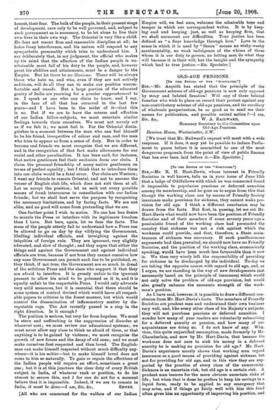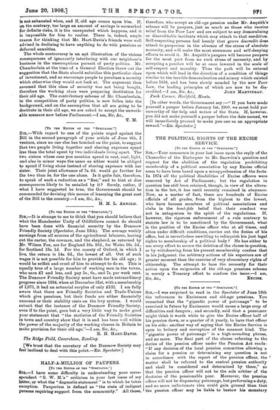[TO THE EDITOE OF THE "SFECTATOL'i
Six,--Mr. R. H. Hart-Davis, whose interest in Friendly Societies is well known, tells us in your issue of June 13th that a lodge of Oddfellows with which he was connected found it impossible to popularise pensions or deferred annuities among its membership, and he goes on to argue from this that though the working class can by means of Friendly Society insurance make provision for sickness, they cannot make pro- vision for old age. I think a different conclusion may be drawn from the facts. But first, in passing, let me ask Mr. Hart-Davis what would now have been the position of Friendly Societies and of their members if some seventy years ago a pessimistic friend of the working class had persuaded the country that sickness was not a risk against which the workman could provide, and that, therefore, a State main- tenance of sickness was necessary. If such pusillanimous arguments had then prevailed, we should now have no Friendly Societies, and the position of the working class, economically speaking, would have been much less faveurahle than it now is. We then very wisely left the responsibility of providing for sickness to be discharged by the individual. To-day we are taking the opposite course with regard to old age, and, as I argue, we are standing in the way of new developments (not necessarily based on the principle of insurance) which would not only solve the problem of old-age provision, but would also greatly enhance the economic strength of the work- man's position.
As I have said, however, it is possible to draw a different con- clusion from Mr. Hart-Davis's facts. The members of Friendly Societies are prudent men and understand their own business very well, and, like every other class of his Majesty's subjects, they will not purchase pensions or deferred annuities. I wonder how many of your readers are voluntarily subscribing for a deferred annuity or pension, and how many of our acquaintance are doing so. I do not know of any. Why, then, this quite unjustified assumption, made formerly by Mr. Chamberlain, and now by Mr. Hart-Davis, that because the workman does not care to sink his money in a deferred annuity he is making no provision for old age P Mr. Hart- Davis's experience merely shows that working mon regard insurance as a good means of providing against sickness, but not for providing for old age, and in this view they are sup- ported by the practice of every class of the community. Sickness is an uncertain risk, but old age is a certain risk. A prudent man insures for the more obvious uncertain risks of life ; but when that is done he prefers to keep his savings in a liquid form, ready to be applied to any emergency that may arise, and if things go fairly well with him this fund often gives him an opportunity of improving his position, and fit not exhausted when, and if, old age comes upon him. If, on the contrary, too large an amount of savings is earmarked for definite risks, it is the unexpected which happens, and it is impossible for him to realise. There is, indeed, ample reason for thinking that Mr. Hart-Davis's friends were well advised. in declining to have anything to do with pensions or deferred annuities.
The whole controversy is an apt illustration of the vicious consequences of ignorantly interfering with our neighbour's business in the unscrupulous pursuit of party politics. Mr. Chamberlain at the time of a General Election threw out the suggestion that the State should subsidise this particular class pf investment, and so encourage people to purchase a security which otherwise they would not look at. The argument then assumed that this class of security was not being bought, therefore the working class were preparing destitution for their old age. The contributory scheme of Mr. Chamberlain, in the competition of party politics, is now fallen into the background, and on the assumption that all are going to be destitute in their old age, we are asked to accept the unwork- able measure now before Parliament. —I am, Sir, &c., T. X











































 Previous page
Previous page